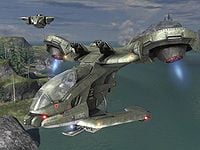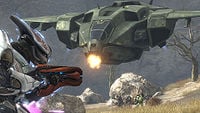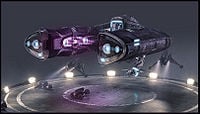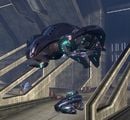VTOL: Difference between revisions
From Halopedia, the Halo wiki
Sith Venator (talk | contribs) (I would argue that the Pod, Darter, and Albatross are also VTOL, but I'm not for sure.) |
m (Link cleanup, replaced: Type-52 Phantom → {{Pattern|Ru'swum|Phantom}} (2)) |
||
| (33 intermediate revisions by 12 users not shown) | |||
| Line 1: | Line 1: | ||
{{ | {{Status|Canon}} | ||
{{Wikipedia}} | |||
{{Quote|Radio for VTOL, heavy lift gear.|Avery | {{Quote|Radio for VTOL, heavy lift gear.|[[Sergeant Major Avery J. Johnson]]<ref>'''[[Halo 3]]''', campaign level, ''[[Arrival]]''</ref>}} | ||
[[File:Hornets.jpg|thumb|A UNSC Hornet, a UNSC VTOL aircraft. The Pelican in the background is also VTOL capable. They both use a jet propulsion system near the "wings".]] | |||
'''Vertical Take-off and Landing''', abbreviated to '''VTOL''', is a classification of aircraft meaning that take-off and landing, rather than needing a runway down which a craft travels to build up speed and lift, is conducted vertically by thrusters or propellers. The key advantage of VTOL capability is that it enables an aircraft to hover over an area, allowing for longer loiter time, and allow the craft to operate from a diverse array of airfields, using less space to get airborne. VTOL capability uses more fuel than Conventional-Takeoff-and-Landing (CTOL) capability, though.<ref>[ | '''Vertical Take-off and Landing''', abbreviated to '''VTOL''', is a classification of aircraft meaning that take-off and landing, rather than needing a runway down which a craft travels to build up speed and lift, is conducted vertically by thrusters or propellers. The key advantage of VTOL capability is that it enables an aircraft to hover over an area, allowing for longer loiter time, and allow the craft to operate from a diverse array of airfields, using less space to get airborne. VTOL capability uses more fuel than Conventional-Takeoff-and-Landing (CTOL) capability, though.<ref>[[Wikipedia:VTOL|'''Wikipedia''': ''VTOL'']]</ref> | ||
==UNSC== | ==UNSC== | ||
[[ | [[File:HaloReach - Falcon.png|thumb|A UH-144 Falcon from [[Halo: Reach]].]] | ||
For the most part, UNSC aircraft use jet thrusters mounted on pivots to provide vertical thrust. The dominant advantage of this is that it is capable of being used for conventional thrust as well, including horizontal and lateral thrust, by tilting the jet engines. Aircraft such as the [[D77-TC Pelican]], the [[AC-220 Vulture]] gunship, and the [[AV-14 Hornet]] use this type of VTOL configuration. In addition the [[UH-144 Falcon]] | For the most part, [[UNSC]] aircraft use jet thrusters mounted on pivots to provide vertical thrust. The dominant advantage of this is that it is capable of being used for conventional thrust as well, including horizontal and lateral thrust, by tilting the jet engines. Aircraft such as the [[D77-TC Pelican]], the [[AC-220 Vulture]] gunship, and the [[AV-14 Hornet]] use this type of VTOL configuration. In addition, the [[UH-144 Falcon]], in service with the [[UNSC Army]], is also a VTOL craft. | ||
Another method is by using spinning propellers to provide lift, such as [[Wikipedia:Ducted fan|ducted fans]] or traditional helicopter rotors. Although not as lightweight or economic as jet thrusters, ducted fans provide a higher thrust-to-weight ratio, and can be more efficient, as well as having the advantage of producing less noise, always an advantage in a combat vehicle. Aircraft such as the [[AV-22 Sparrowhawk]] use ducted fans to generate lift, with a fan shrouded in each wing<ref>http://www.halowars.com/forums/thread/45018.aspx</ref> | Another method is by using spinning propellers to provide lift, such as [[Wikipedia:Ducted fan|ducted fans]] or traditional helicopter rotors. Although not as lightweight or economic as jet thrusters, ducted fans provide a higher thrust-to-weight ratio, and can be more efficient, as well as having the advantage of producing less noise, always an advantage in a combat vehicle. Aircraft such as the [[AV-22 Sparrowhawk]] use ducted fans to generate lift, with a fan shrouded in each wing.<ref>http://www.halowars.com/forums/thread/45018.aspx</ref> Although there appear to be no UNSC combat helicopters in service, dropships having supplanted these in their traditional role as air cavalry and gunship support, helicopters are still used by civilian operators.<ref>http://www.bungie.net/News/content.aspx?type=topnews&cid=896</ref> | ||
==Covenant== | ==Covenant== | ||
Covenant craft use [[Anti-gravity technology|artificial gravity generators]] to provide lift. These craft are carried on a cushion of anti-gravity, produced by artificial gravity generators. The {{Pattern|Dextro Xur|Spirit}} and {{Pattern|Ru'swum|Phantom}} dropships are VTOL-capable craft, with the former using an artificial gravity field produced between its two side booms, and the latter using a somewhat more logical layout of ventral hull-mounted generators. | |||
Covenant craft use [[Anti-gravity technology|artificial gravity generators]] to provide lift. These craft are carried on a cushion of anti-gravity, produced by artificial gravity generators. The | |||
==VTOL | ==VTOL aircraft== | ||
{{col-begin}} | |||
{{col-3}} | |||
===UNSC=== | ===UNSC=== | ||
*[[AC-220 Vulture]] | *[[AC-220 Vulture]] | ||
*[[AV-14 Hornet]] | *[[AV-14 Hornet]] | ||
*[[AV-19 SkyHawk]] | |||
*[[AV-22 Sparrowhawk]] | *[[AV-22 Sparrowhawk]] | ||
*[[AV-30 Kestrel]] | |||
*[[AV-49 Wasp]] | |||
*[[D20 Heron]] | |||
*[[D77-TC Pelican]] | *[[D77-TC Pelican]] | ||
*[[D77C-NMPD Pelican]] | *[[D77C-NMPD Pelican]] | ||
*[[D77H-TCI Pelican]] | *[[D77H-TCI Pelican]] | ||
*[[D78-TC Pelican]] | |||
*[[D79-TC Pelican]] | *[[D79-TC Pelican]] | ||
*[[D81-LRT Condor]] | |||
*[[D82-EST Darter]] | *[[D82-EST Darter]] | ||
*[[D96-TCE Albatross]] | *[[D96-TCE Albatross]] | ||
*[[EV-44 Nightingale]] | |||
*[[G79H-TC Pelican]] | *[[G79H-TC Pelican]] | ||
*[[GA-TL1 Longsword]] | *[[GA-TL1 Longsword]] | ||
*[[F-41 Broadsword]] | *[[F-41 Broadsword]] | ||
*[[UH-144 Falcon]] | *[[UH-144 Falcon]] | ||
{{col-3}} | |||
===Covenant=== | ===Covenant=== | ||
*[[ | *{{Pattern|Dextro Xur|Spirit}} | ||
*[[Type- | *[[Type-26 Banshee]] | ||
* | *{{Pattern|Elsedda|Banshee}} | ||
*[[ | *{{Pattern|Bkowe'nei|Vampire}} | ||
*[[Type-31 Seraph]] | |||
*{{Pattern|Ru'swum|Phantom}} | |||
*{{Pattern|Ru'swum|Phantom}} | |||
*{{Pattern|D'nomlhe|Banshee}} | |||
*{{Pattern|Kmiro'sish|Lich}} | |||
*{{Pattern|Mikpramu|Phantom}} | |||
*{{Pattern|Nuro'k Xur|Spirit}} | |||
{{col-3}} | |||
===Forerunner=== | |||
*[[Phaeton]] | |||
{{col-end}} | |||
==Gallery== | |||
<gallery> | |||
File:Halo Reach - TotS Pelican.jpg|A UNSC [[D77-TC Pelican]], a VTOL dropship. | |||
File:Halo Wars Spirit Dropship.jpg|A [[Spirit]] and several [[Banshee]]s, Covenant VTOL aircraft. | |||
Image:Loyalist Type-52 Phantom Troop Carrier.jpg|The Phantom, a Covenant VTOL craft, which uses anti-gravity propulsion. | |||
</gallery> | |||
==List of appearances== | ==List of appearances== | ||
| Line 49: | Line 70: | ||
*''[[Halo: The Fall of Reach]]'' {{1st}} | *''[[Halo: The Fall of Reach]]'' {{1st}} | ||
*''[[Halo: Combat Evolved]]'' | *''[[Halo: Combat Evolved]]'' | ||
*''[[Halo: The Flood]]'' | *''[[Halo: The Flood]]'' | ||
*''[[Halo: First Strike]]'' | *''[[Halo: First Strike]]'' | ||
| Line 65: | Line 84: | ||
*''[[Halo: Uprising]]'' | *''[[Halo: Uprising]]'' | ||
*''[[Halo 3]]'' | *''[[Halo 3]]'' | ||
*''[[Halo: Contact Harvest]]'' | *''[[Halo: Contact Harvest]]'' | ||
*''[[Halo: The Cole Protocol]]'' | *''[[Halo: The Cole Protocol]]'' | ||
*''[[Halo Wars: Genesis]]'' | *''[[Halo Wars: Genesis]]'' | ||
*''[[Halo Wars]]'' | *''[[Halo Wars]]'' | ||
{{col-3}} | |||
*''[[Halo: Helljumper]]'' | *''[[Halo: Helljumper]]'' | ||
*''[[The Life]]'' | *''[[The Life]]'' | ||
| Line 75: | Line 94: | ||
*''[[Halo Legends]]'' | *''[[Halo Legends]]'' | ||
**''[[Prototype]]'' | **''[[Prototype]]'' | ||
**''[[The Package]]'' | **''[[The Package (animated short)|The Package]]'' | ||
**''[[Homecoming]]'' | **''[[Homecoming]]'' | ||
**''[[Origins]]'' | **''[[Origins]]'' | ||
| Line 84: | Line 103: | ||
**''[[Blunt Instruments]]'' | **''[[Blunt Instruments]]'' | ||
**''[[The Mona Lisa]]'' | **''[[The Mona Lisa]]'' | ||
*''[[Halo: Blood Line]]'' | *''[[Halo: Blood Line]]'' | ||
*''[[Remember Reach]]'' | *''[[Remember Reach]]'' | ||
| Line 90: | Line 108: | ||
**''[[Deliver Hope]]'' | **''[[Deliver Hope]]'' | ||
*''[[Halo: Reach]]'' | *''[[Halo: Reach]]'' | ||
{{col-3}} | |||
*''[[Halo: Fall of Reach]]'' | *''[[Halo: Fall of Reach]]'' | ||
**''[[Halo: Fall of Reach - Boot Camp|Boot Camp]]'' | **''[[Halo: Fall of Reach - Boot Camp|Boot Camp]]'' | ||
| Line 95: | Line 114: | ||
**''[[Halo: Fall of Reach - Invasion|Invasion]]'' | **''[[Halo: Fall of Reach - Invasion|Invasion]]'' | ||
*''[[Halo: Glasslands]]'' | *''[[Halo: Glasslands]]'' | ||
*''[[Halo: Combat Evolved Anniversary]]'' | |||
**''[[Terminal (Halo: Combat Evolved Anniversary)|Terminals]]'' | |||
*''[[The Commissioning]]'' | *''[[The Commissioning]]'' | ||
*''[[Halo: The Thursday War]]'' | *''[[Halo: The Thursday War]]'' | ||
| Line 103: | Line 124: | ||
*''[[Halo: Spartan Assault]]'' | *''[[Halo: Spartan Assault]]'' | ||
*''[[Halo: Initiation]]'' | *''[[Halo: Initiation]]'' | ||
*''[[Halo: Escalation]]'' | |||
*''[[Halo: Mortal Dictata]]'' | |||
*''[[Halo 2: Anniversary]]'' | |||
**''[[Terminal (Halo 2: Anniversary)|Terminals]]'' | |||
*''[[Halo: Spartan Strike]]'' | |||
*''[[Halo: Fleet Battles]]'' | |||
*''[[Halo: The Fall of Reach - The Animated Series]]'' | |||
*''[[Halo 5: Guardians]]'' | |||
*''[[Halo: Shadow of Intent]]'' | |||
*''[[Halo Wars 2]]'' | |||
{{col-end}} | {{col-end}} | ||
==Sources== | ==Sources== | ||
{{Ref/Sources}} | |||
[[Category:Vehicles]] | [[Category:Vehicles]] | ||
[[Category:Military | [[Category:Military terminology]] | ||
Latest revision as of 20:52, June 17, 2022
| There is more information available on this subject at VTOL on the English Wikipedia. |
- "Radio for VTOL, heavy lift gear."
- — Sergeant Major Avery J. Johnson[1]
Vertical Take-off and Landing, abbreviated to VTOL, is a classification of aircraft meaning that take-off and landing, rather than needing a runway down which a craft travels to build up speed and lift, is conducted vertically by thrusters or propellers. The key advantage of VTOL capability is that it enables an aircraft to hover over an area, allowing for longer loiter time, and allow the craft to operate from a diverse array of airfields, using less space to get airborne. VTOL capability uses more fuel than Conventional-Takeoff-and-Landing (CTOL) capability, though.[2]
UNSC[edit]
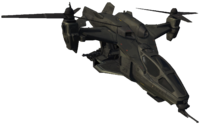
For the most part, UNSC aircraft use jet thrusters mounted on pivots to provide vertical thrust. The dominant advantage of this is that it is capable of being used for conventional thrust as well, including horizontal and lateral thrust, by tilting the jet engines. Aircraft such as the D77-TC Pelican, the AC-220 Vulture gunship, and the AV-14 Hornet use this type of VTOL configuration. In addition, the UH-144 Falcon, in service with the UNSC Army, is also a VTOL craft.
Another method is by using spinning propellers to provide lift, such as ducted fans or traditional helicopter rotors. Although not as lightweight or economic as jet thrusters, ducted fans provide a higher thrust-to-weight ratio, and can be more efficient, as well as having the advantage of producing less noise, always an advantage in a combat vehicle. Aircraft such as the AV-22 Sparrowhawk use ducted fans to generate lift, with a fan shrouded in each wing.[3] Although there appear to be no UNSC combat helicopters in service, dropships having supplanted these in their traditional role as air cavalry and gunship support, helicopters are still used by civilian operators.[4]
Covenant[edit]
Covenant craft use artificial gravity generators to provide lift. These craft are carried on a cushion of anti-gravity, produced by artificial gravity generators. The Dextro Xur-pattern Spirit and Ru'swum-pattern Phantom dropships are VTOL-capable craft, with the former using an artificial gravity field produced between its two side booms, and the latter using a somewhat more logical layout of ventral hull-mounted generators.
VTOL aircraft[edit]
Gallery[edit]
A UNSC D77-TC Pelican, a VTOL dropship.
